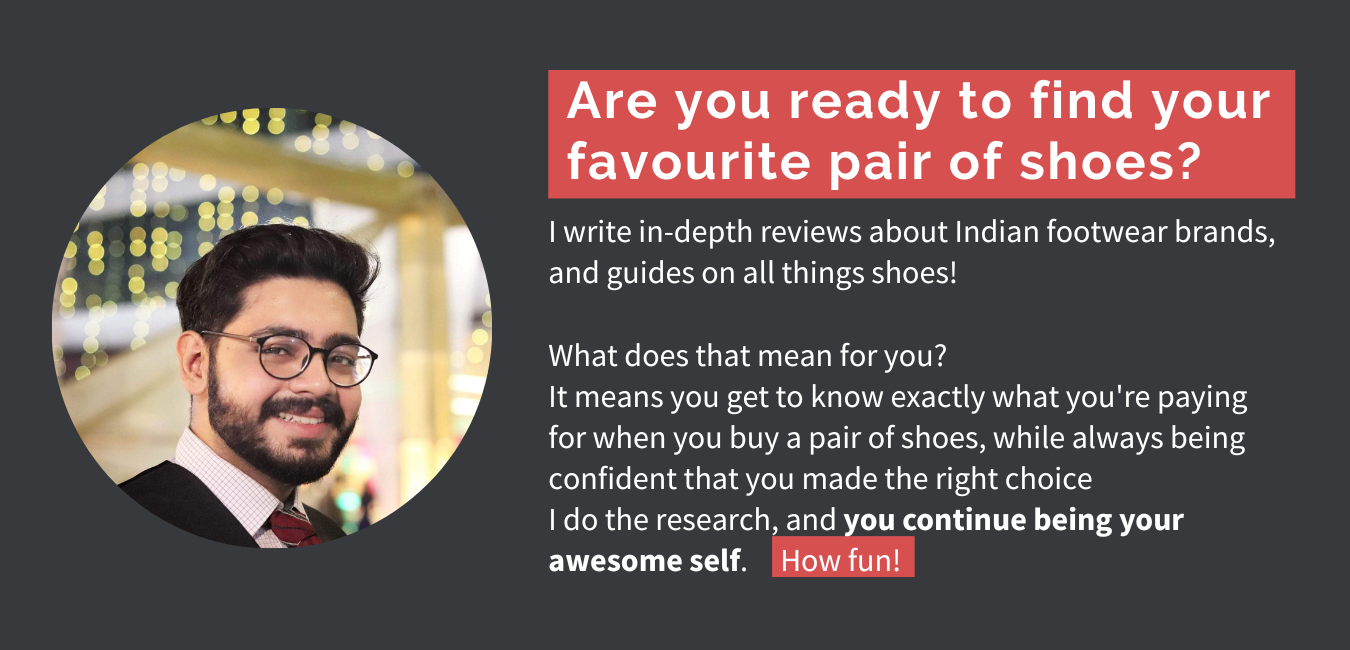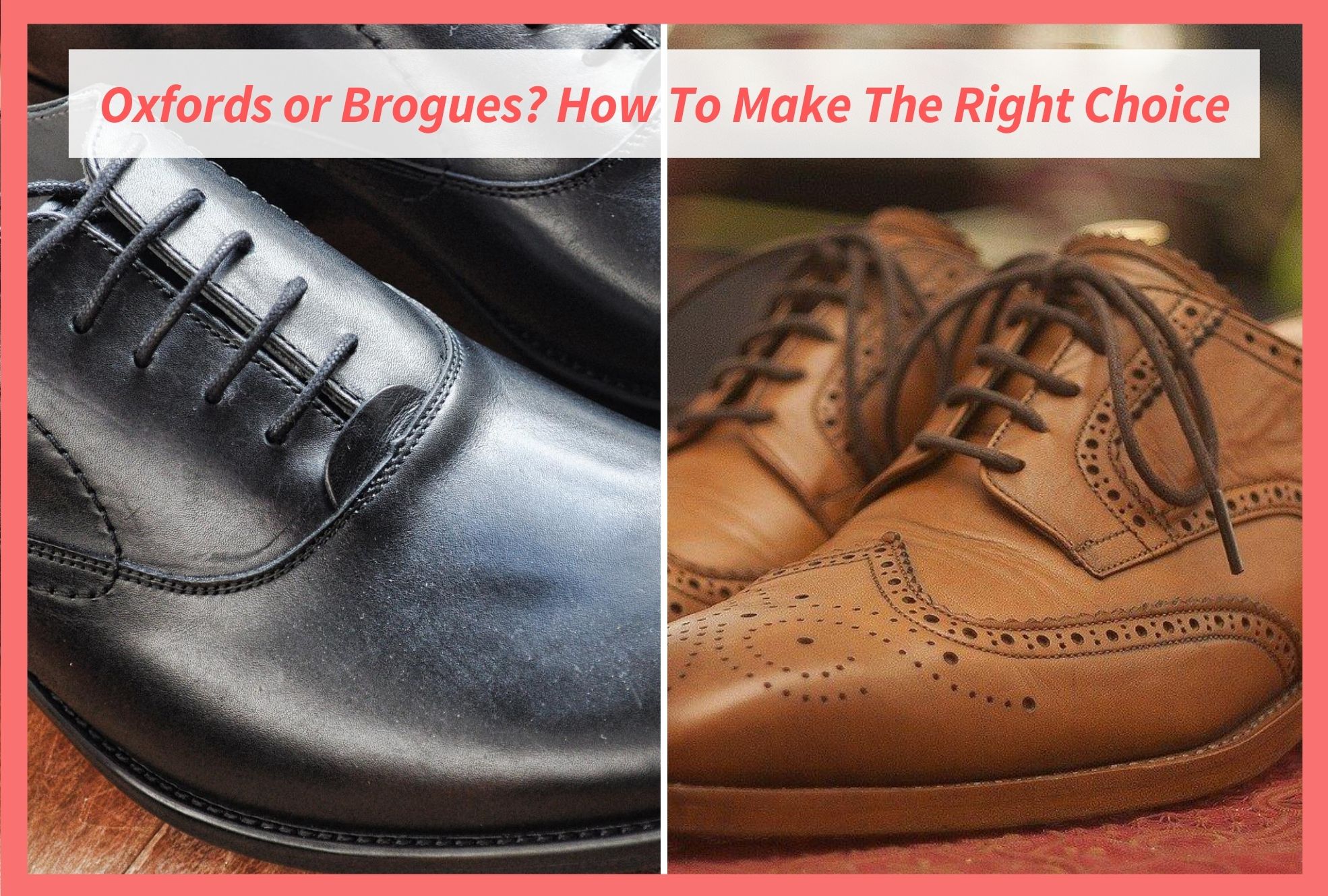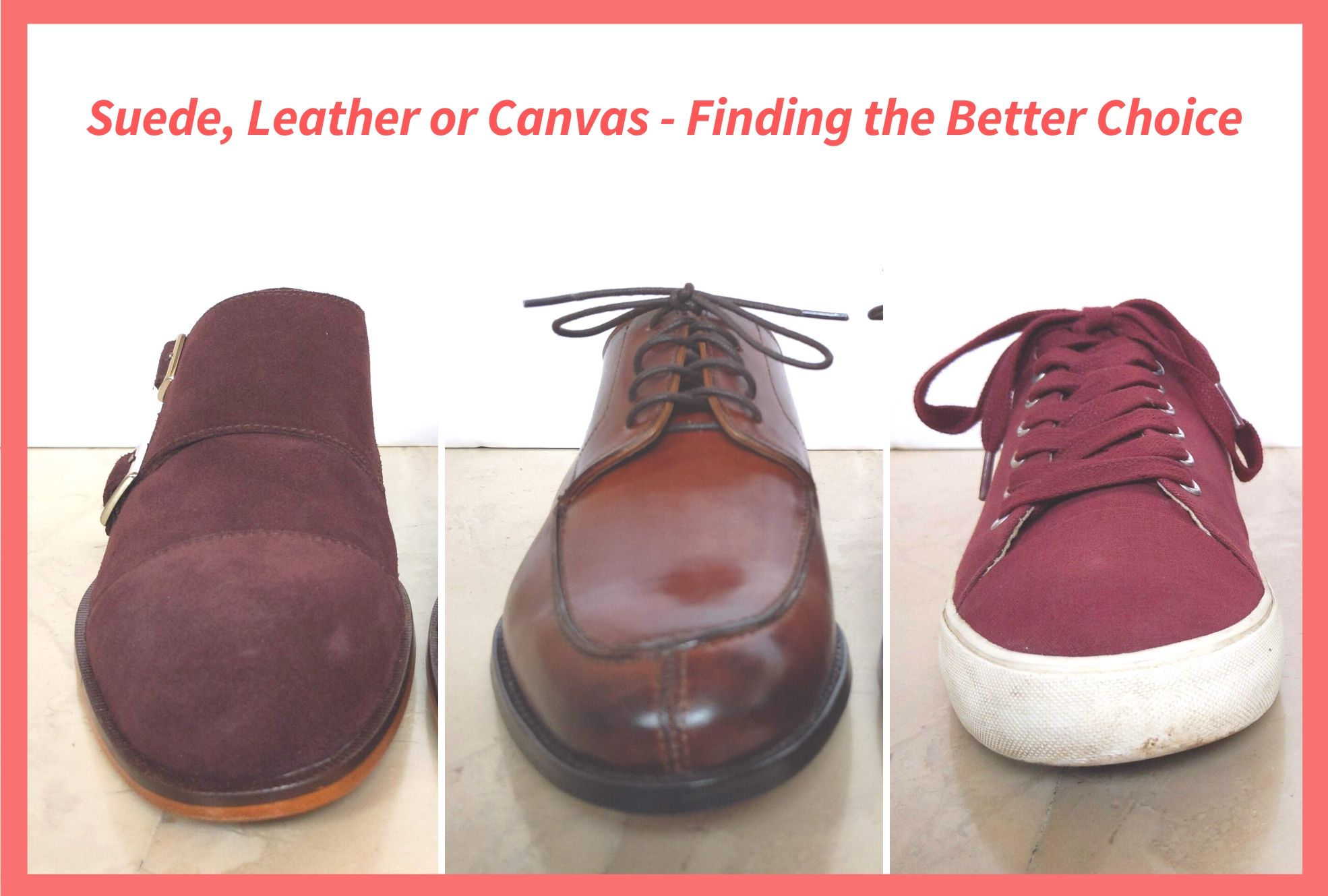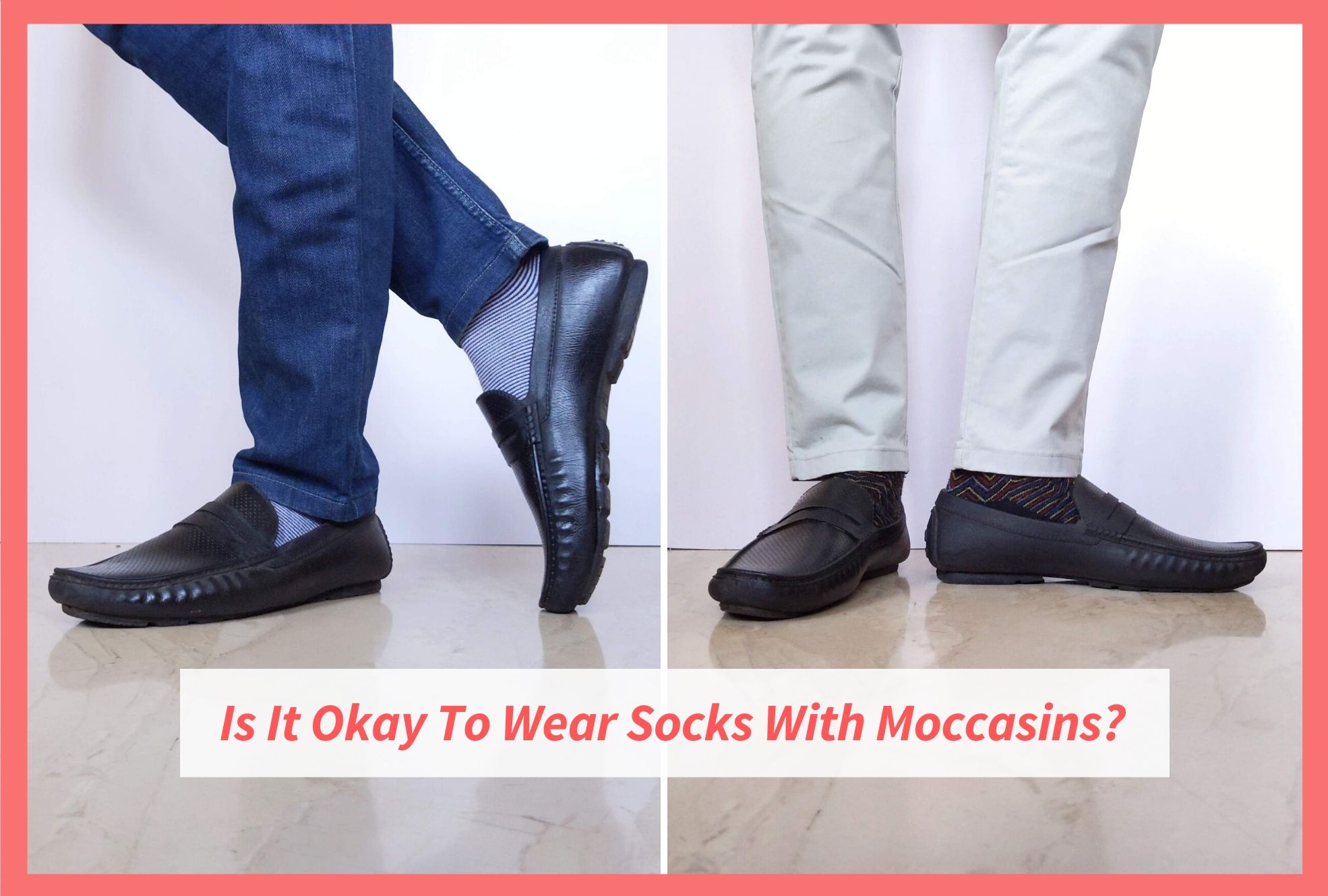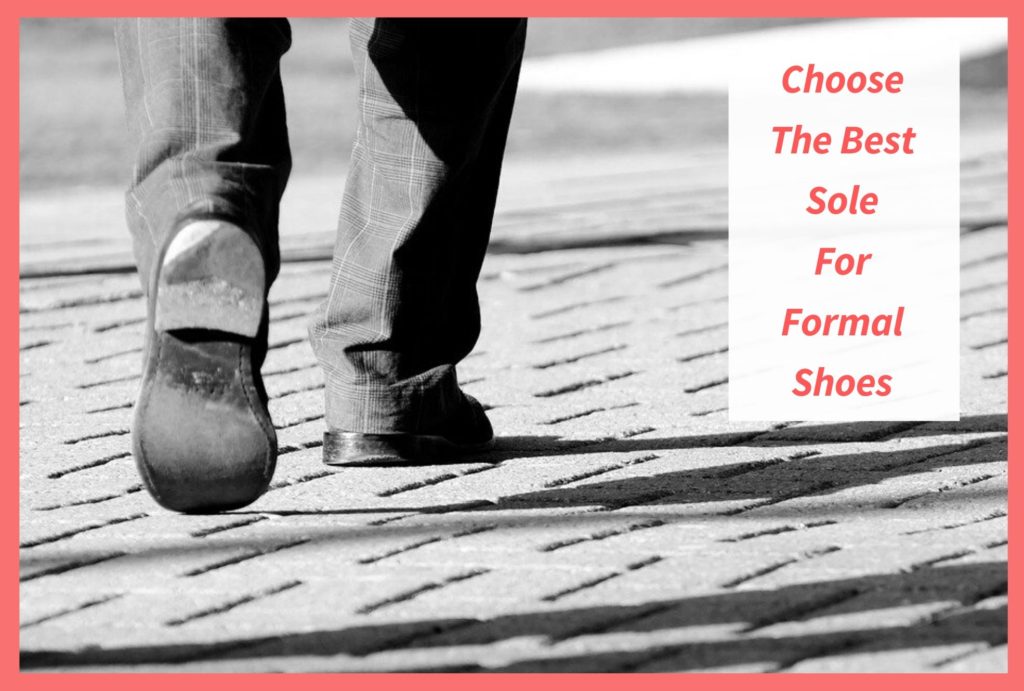
For a major part of the first 24 years of my life, I wore rubber-soled shoes. To be precise, rubber-soled square toe shoes (ugh)
So when I got into shoes, thinking about the soles was not even an afterthought – they had to be rubber, of course! Well, turns out I was wrong.
There are actually many different sole materials to choose from while buying a pair of formal shoes. Leather, Rubber, PU, EVA, and more…
With so many options, it can get confusing to choose one over the other, but it’s not a very hard choice if you follow the guidelines laid out in this post 🙂
The best sole material for formal shoes depends on the work environment, mode of transport, and budget. Leather sole shoes are best for office-goers who drive or use public transport to get to work, whereas rubber and PU soles are better suited for outdoor usage.
How to Choose the Best Sole for Formal Shoes
The answer to these simple questions will help you pick the right type of sole material for your formal shoes
#1: Where Do You Work?
Do you work indoors or outdoors? For the major part of your day, do you walk on carpets and floors, or pavements and rough ground?
If it’s the former, then leather soles are a great option for you – they look cleaner and are more professional for the office environment. For outdoors: rubber and other synthetic soles will be better as they will have more traction on rough surfaces
Additionally: if you’re going to be on your feet for extended period of time then PU (being light and flexible) is a very good option too.
PSA: New leather soles can be very slippery on smooth floors. I can’t count the number of times I’ve almost landed on my rear only to balance myself at the last moment. Over time, this gets better with the leather surface being rubbed against the ground/floor.
Some brands also attach strips of rubber on the bottom of their leather soles to help with this – lookout for thoseBut definitely don’t attempt to sprint in these 😉
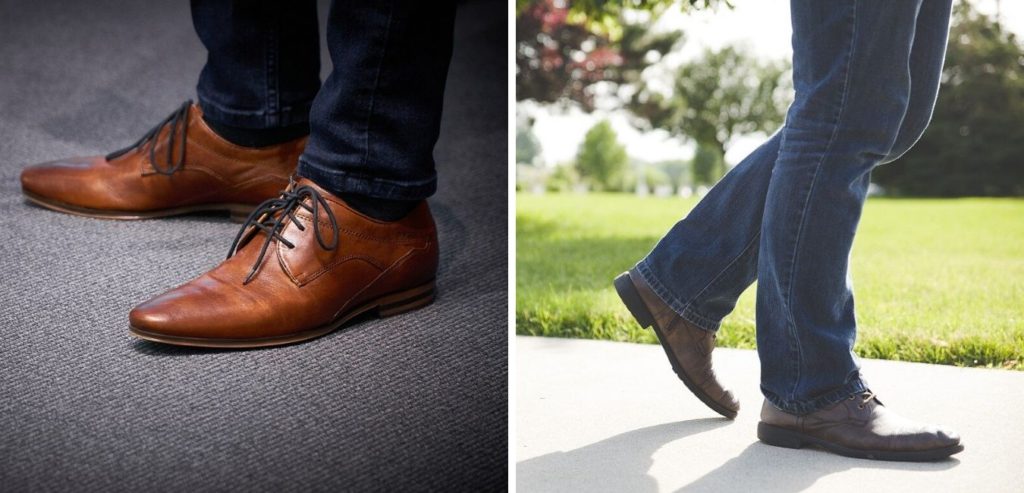
#2: How Do You Get To Work?
While the location of your work is important, the mode of transport you take to get to it also plays a role in choosing the best sole material for your dress shoes
If you have to walk a lot to get to work, then rubber/ PU/EVA soles will be of better value to you as they would be easier to walk over long distances. Besides, these are also naturally waterproof (which leather isn’t) so water won’t seep in through the rubber soles during the monsoon/winter
Also, EVA soles are insulating, so it’s great for cold places
On the other side, if you mostly use public transport – then a pair of good quality leather-soled dress shoes will be comfortable enough to reach the workplace.
And there are always leather weather-proofing methods, in case you ever have to face the rains/snow during your commute
Note: Since we are discussing formal shoes, I’m assuming that the shoe upper is of a breathable material and so breathability is not a factor considered for choosing soles. Natural Leather will always be more breathable than rubber or other synthetic materials
#3: How Often Do You Like To Change Shoes?
Okay, this might be controversial. Some people prefer having new shoes every few years or so.
Me? I like to buy the greatest quality of shoes I can afford and use them for as long as a can. With time, good shoes develop character which makes them more beautiful
It’s a matter of personal choice, so I won’t debate if you like to throw away shoes within a few years. Although, I would highly recommend you to at least consider the later 🙂
The frequency of changing formal shoes is an important factor in deciding the soles because if you discard old shoes often, then you’re better off buying rubber-soled / PU ones as they’ll be cheaper (more on that in #5)
Even EVA, in this case, would be a good fit. Soles made out of EVA will be very comfortable, light, and ultra-cushioned. Yes, over time they will get compressed, but by then you would’ve worn them enough and would be looking to change anyway 😉
For leather soles, Goodyear Welting and Blake Stitching are the most common methods used to attach them to the shoe. These methods make the shoes easy to resole, so you’d be losing out on a big chunk of their value if you don’t use them to their fullest
Pro Tip: A good compromise here would be to look for shoe brands that offer rubber sole in Goodyear Welt / Blake Stitch construction methods. That way if you do decide to keep them for longer – resoling might just be possible when required
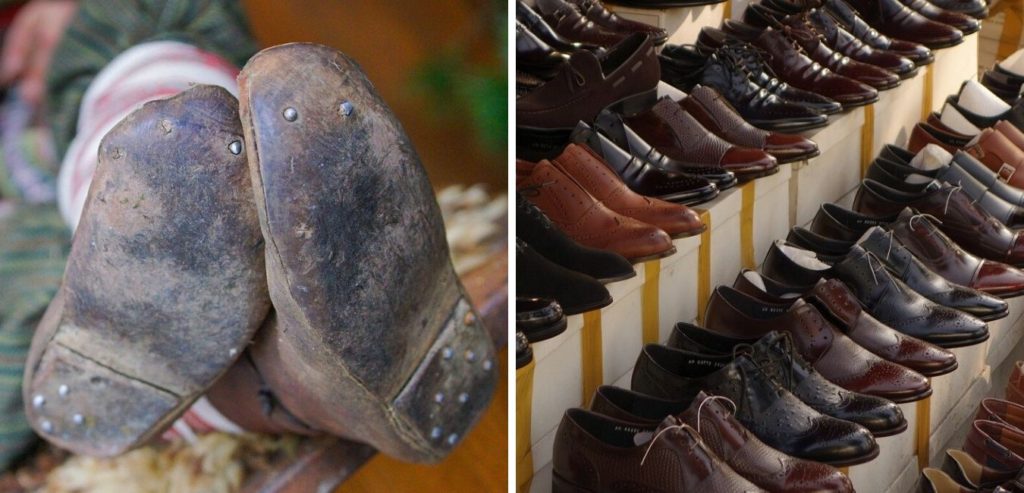
#4: How Much Are You Willing To Spend?
I’ll just go ahead and say it – good shoes are an investment. If taken care of, they’ll last decades
And leather soles are a mark of quality for dress shoes as they denote the care and effort undergone in making them. Unlike rubber or other synthetic soles, leather soles cannot be simply stuck onto the shoes. They have to be welted, which is a processing of attaching them to the upper of the shoes
All of this naturally makes shoes with leather soles expensive. Whereas everything else will generally be cheaper, and so the shoes cheaper as well
Your budget is probably the most important question that you should answer at this stage.
If you can afford to buy formal shoes with leather soles, go for it!
If not, there are some great quality pairs in rubber soles as well
#5: Click Clack Click !?
Yes, we’re talking about the heel-clicking sound that leather soles make when they hit the floor. I’m a big fan of the sound, but I’ve been told many people don’t like it. Rubber soles would be the best for such folks
For others who prefer leather soles but don’t like the click: find a brand that attaches those rubber strips on the heel (as in #1).
For everyone else like me, click away B-)
[BONUS] How To Identify Different Sole Materials
When online shopping, most brands will mention the type of soles that they use on their shoes. If they don’t, you can always drop an email and check with them. I can’t say if the big brands will get back with a response, but small business owners usually do – and often provide the best service
When shopping in stores / malls though, you will have to rely on the store attendant or use your own judgement. Here are some tips:
How To Identify Leather Soles
Leather soles would be smooth and shiny when new, and you should be able to feel that by running your hand over the soles
I also like to use something I call the knock test – basically knocking different parts of the sole with my forefinger and observing the resultant sound. Leather soles will have a loud, almost wooden knock
There’s another way to double check this: Shoes with leather soles mostly will have a rubber strip on the heel to prevent slippage. Use this feature by knocking on the heel and then the rest of the sole. If it sounds different, you may have your answer
How To Identify Rubber Soles
Rubber Soles will have a very distinct look and so it shouldn’t be very difficult to identify. They will have a matte texture and rubbery smell
(I’m sure you know how rubber smells, right?)
Rubber soles will give off a softer knock than leather. It is as if the material is absorbing most of the sound
How To Identify PU Soles
PU soles are soft, flexible and have good bend performance. If the shoes bend well then they’re likely to be made of PU soles. I don’t think stores will allow you to bend their shoes (especially formal) though, unless it’s a feature that they’re marketing 😛
PU will not be smooth like leather. Your hand should not slip and slide when you place it over a PU leather
Leather or Rubber?
Leather is elegant, more durable and lasts much longer than rubber. On the other hand, rubber is waterproof, inexpensive with zero break-in period. The trick is to choose which is more appropriate for your environment
Have you decided on the best sole material for your formal shoes?
If you have some confusions or questions, feel free to send me an email or drop a comment below
I would love to hear your thoughts

